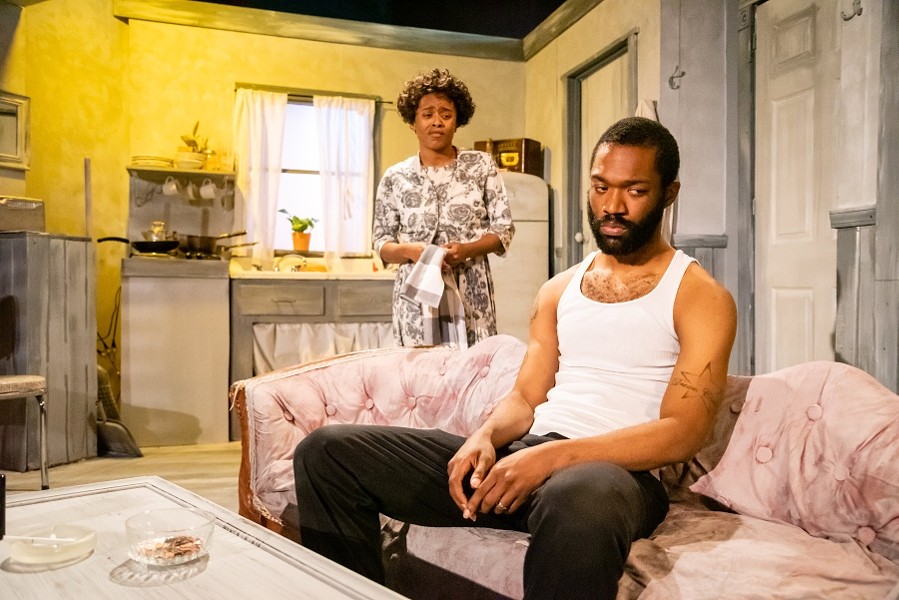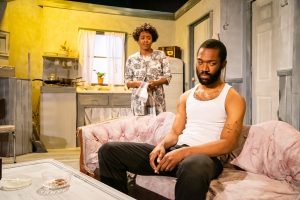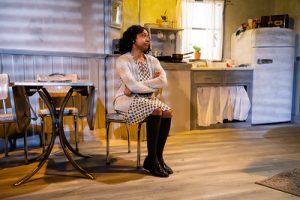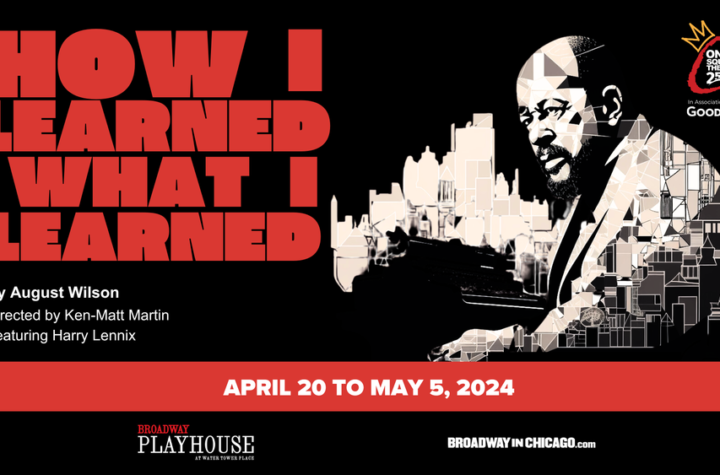
 Highly Recommended **** The Invictus Theatre Company’s production of “A Raisin in the Sun” does a remarkable job recreating the circumstances of an African-American family on Chicago’s South Side sometime during the mid- to late-1950s. Nicely portrayed via wonderful acting, realistic scenic design and props, well-fashioned costumes, and highly accomplished directing by Aaron Reese Boseman, the characters reveal their hopes, ambitions, and struggles through frank discussions, all within the context of their home and family life. Each in their own way measures success in accordance with their ability (or inability) to live the American Dream, that is, attain opportunities for jobs and income and a decent living standard unrestricted by the color barrier.
Highly Recommended **** The Invictus Theatre Company’s production of “A Raisin in the Sun” does a remarkable job recreating the circumstances of an African-American family on Chicago’s South Side sometime during the mid- to late-1950s. Nicely portrayed via wonderful acting, realistic scenic design and props, well-fashioned costumes, and highly accomplished directing by Aaron Reese Boseman, the characters reveal their hopes, ambitions, and struggles through frank discussions, all within the context of their home and family life. Each in their own way measures success in accordance with their ability (or inability) to live the American Dream, that is, attain opportunities for jobs and income and a decent living standard unrestricted by the color barrier.
The Youngers each have their own ideas about the uses for the $10,000 that Lena, the mother (Cheryl Frazier), acquires by virtue of her now-deceased husband’s insurance policy. From her perspective, moving into an all-white neighborhood—where expenses are fewer and conditions of daily living are better—might be the answer. Walter, her son (Michael Lewis) feels differently. He believes that the purchase of a liquor store might be a more appropriate use of the money. By opening his own small business, he could generate his own income and acquire a better style of life than on his very modest salary as a limousine driver. He dreams of working in the corporate world and eventually purchasing a yacht and other trappings of wealth known to the rich and famous. In contrast, Walter’s wife Ruth (Nyajai Ellison) is not keen on the liquor store idea, considering that her husband has a drinking problem and uses alcohol as a means of escape from his day-to-day problems. She is now pregnant with their second child and more concerned about keeping a roof over their heads rather than aspiring to upward mobility. Rather, she is thinking about having an abortion, so that whatever money the family has left can be spent on raising their son Travis (Nelson Simmons). Beneatha (Ashley Joy), Walter’s younger sister, who is in college, wants to use her portion of the funds to pay for medical school training, as her aim is to become a doctor.
The name Beneatha is telling, and Ashley Joy delivers marvelously in this role, shining both as an intellectual and a young woman appreciative of her family and male attention, yet stunted by her circumstances. She finds herself beneath her mother’s thumb and subservient in a woman’s role as she occupies herself with the affections of two men: George Murchison (Keith Surney) who believes “What’s white is right” and Joseph Asagai (Jo Schaffer), who is from Nigeria and enamored of all things African. Joseph convinces Beneatha that, despite the fact that Africa is not a perfect place, she can find a more authentic expression of herself as a black woman than in America, where “colored people” are still viewed by the larger society as second-class citizens. (Note that the terms “colored” and “Negro” are frequently used throughout the play. Hansberry wrote in an era prior to the “black is beautiful” movement and before the terms “black” and “African-American” and “person of color” became the current idiom.)
Jake Busse, as Karl Lindner, is the only white actor in the show. In his role, he represents homeowners who want to preserve their property values by preventing the sale of a house in a white neighborhood to a black family. As Lena begins to question her judgment of wanting to live next door to whites, she looks back and notes that throughout her life, her dreams for success have been hindered. Why have them in the first place? But in the same way that she transfers the insurance money to her son, she transfers her dreams to him. Walter, then, takes over for her and establishes his place as the “man in the family.” Despite his initial desire to give in to what the white “boss-man” tells him to do, he ultimately finds strength of character within himself. He stands up for his inner worth and dignity and his family’s respectability and rises above cultural norms and economic expectations placed on blacks by conventional white society.
Upstairs neighbor Wilhelmina Johnson (Courtney Gardner) lights up the stage with her kindness and genuineness. Her facial expressions are classic; the acting is an absolute delight. She warns that a house purchased by black people in a segregated white neighborhood could be firebombed by angry and prejudiced whites, who want to keep out blacks at all costs, so as to maintain property values. Later on, when Walter’s associate Bobo (Lewis Jones) reveals that their former business partner Willy has absconded with much of their funds, the question remains: Will they buy the house or not?
When the play was originally produced on Broadway, the role of Mrs. Johnson was cut out in order to make the overall resolution of the story seem happier. But I was glad that she was included in the current production. Not only does her dialogue infuse a dimension of realism into the story, but it also stirred up my earliest memories of living on Chicago’s South Side. It was probably 1959 or 1960 (and I was three or four years old) when I was awakened on an early Sunday morning by the sounds of fire trucks and rushing water. When I looked out of my window at a house on the adjacent block, I saw smoke. I learned some years later from my parents that this had been a racially-motivated firebombing. This incident was my first experience with serious violence based on hate, and it made a profound impression on me. But I digress….
Boseman’s fine direction adds to creative flow of the performance. Kudos to movement choreographer Madame Kristen Glover and fight/intimacy coordinator Glenn Thompson, both of whom have provided the necessary guidance for the actors to make use of the stage brilliantly as they interact with one another. Kevin Rolfs needs to be called out specifically for the 1950s set and fantastic props design. It is a joy to watch how smoothly all of the characters use the numerous props on stage to create an impression in the audience’s mind that we are in a real space shared by real people. Costume design by Rueben D. Echoles is accurate for the time period and handled extremely well. Sound design by Warren Levon is generally good, although the mix could have been improved in spots. Some ambient sounds occasionally covered up a bit of the dialogue. Things got better in the second act when a background hum was eliminated (not to be confused with the sound of the HVAC system). Note that the presentation begins with a rendition of Langston Hughes’ poem “Harlem”, where one of the lines alludes to the phrase “a raisin in the sun”, an allusion to dying on the vine. Finally, the incorporation of the music track written by composer Christie Chiles Twillie makes the production special.
On the night I visited, cords strung across the farthest aisle represented a trip hazard, as both a laptop computer and a phone charger were plugged into wall outlets from seats directly across the aisle. This is not smart, especially in the event of a blackout or an emergency. Note that stairs to various rows in the audience are of differing heights, and the upholstered seats have definitely been well-sat-on! The lobby was much too cold on a chilly day despite the use of space heaters. Basically, the theater needs some tender, loving attention.
The Invictus’s production of Lorraine Hansberry’s “A Raisin in the Sun” is very well done. A nearly 3-1/2-hour show goes by quickly due to snappy, honest dialogue and compelling characters. This story provides an insight into Chicago’s racially segregated neighborhoods and the struggles that African-Americans have had to face in achieving a better life. Above all, the show demonstrates that people of all racial and ethnic groups and backgrounds are more alike than different in seeking some amount of prosperity for themselves and their families.
“A Raisin in the Sun” is playing until Sunday, March 15, 2020, at The Buena, Pride Arts Center, 4147 N. Broadway, Chicago.
Performance schedule:
Mondays at 7:30 p.m.
Thursdays, Fridays, Saturdays at 7:30 p.m.
Sundays at 3:00 p.m.
Tickets are $25, and are available at www.invictustheatreco.com or at the door (subject to availability).
Street parking is available.
To see what others are saying, visit www.theatreinchicago.com, go to Review Round-Up and click at “A Raisin In The Sun”.






More Stories
“Joe Turner’s Come and Gone”
“How I Learned What I Learned” reviewed by Julia W. Rath
“How to Know the Wild Flowers: A Map” reviewed by Julia W. Rath